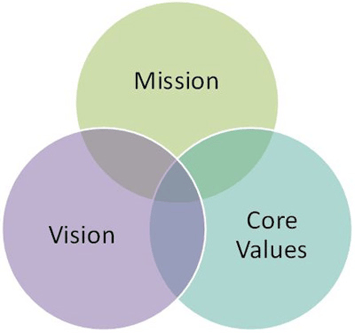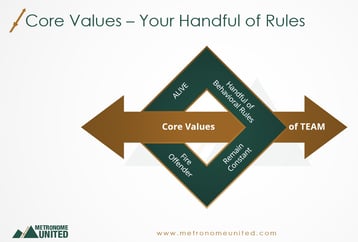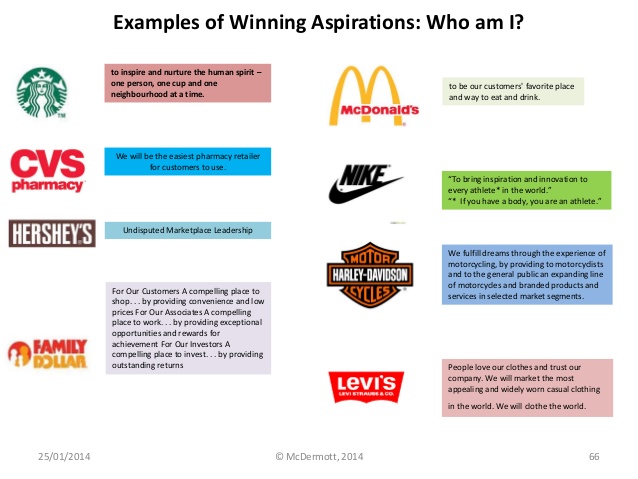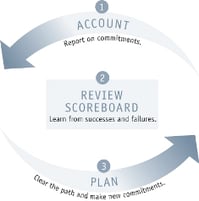One of my customers was facing a difficult decision.
One of their vendors made them an offer that would help the business grow substantially, yet there was something suspicious about the offer. They were a bit uncomfortable with it. On the surface, it appeared fine, yet undermining it was deception, while not overt, it still represented not being completely ethical with their customers.
would help the business grow substantially, yet there was something suspicious about the offer. They were a bit uncomfortable with it. On the surface, it appeared fine, yet undermining it was deception, while not overt, it still represented not being completely ethical with their customers.
The conflict lingered and caused a debate amongst the leadership team. Finally, one of the team suggested they review their Mission, Vision, and Values. Upon doing so it was a quick and immediate decision. They turned down the vendor because while the offer would grow their business, it would do so in a way that would ultimately disagree with their values.
Why Share Your Values?
This short video by Simon Sinek shares “How should a company share its values?”
Sinek doesn’t just share how, he offers why. One reason to share: it makes you, and your team more accountable. Sinek points out what not to use as a value. Honesty isn’t a value to Sinek. If you do choose honesty, you probably have more problems than you think. Making your Core Values Actionable is perhaps the greatest insight he provides. Watch:
Making Your Values Stick
How do we make our values, purpose, and vision stick in our business?
It’s not necessarily easy, however, it is simple. And perhaps in its simplicity, it is easy for some entrepreneurs.
 This is because the simplest and easiest way to get your values to stick is to always live, act, and envision your business, as being and living up to these standards. This means you most importantly, and your leaders must embody them. It means not allowing anyone in your organization to not live them.
This is because the simplest and easiest way to get your values to stick is to always live, act, and envision your business, as being and living up to these standards. This means you most importantly, and your leaders must embody them. It means not allowing anyone in your organization to not live them.
Your Core Values should follow these Four Rules:
- Be Alive in Your Business
- Just a handful of Behavioral Rules (Not too many)
- Remain Constant over Time
- BE Willing to Fire Anyone Failing to Follow Them
The Truth About Impostor Syndrome
In a recent Twitter video, Dallas Mavericks Owner Mark Cuban shared some thoughts on impostor syndrome. #OwnWhatsYours#MarkCuban#Entrepreneurship#Mindset#Inspiration
As the leader of your business, you can feel you’re an imposter at times. This can be why you might allow behavior not in line with your values to go overlooked. With the challenge of getting employees today, it’s easy to disregard disingenuous behavior. You’re afraid you won’t be able to find someone to replace the person.
Releasing someone means everyone else must work harder, overtime hours, it puts more stress on your team and may result in losing more staff.
I get it.
It still doesn’t make it a good decision.
Higher standards always attract the best not only in your present staff but also in attracting new staff.-resized-600.gif?width=600&height=269&name=core-values-chart_(jim_collins)-resized-600.gif)
"I'm going to tell you a secret," Cuban said. "Me, you, we all have impostor syndrome. We all look at our companies and ask ourselves can this really be successful? Why me, why? Why do I think my company can be more successful?”
"And then you just refocus and remind yourself why you're doing it." (Do you see the value in sharing your values here?)
We work extremely hard at our craft to obtain opportunities few others get. When we get this chance and are in this position, we convince ourselves we don’t really belong and that it’s only a matter of time until we’re discovered as frauds.
Cuban’s point is that while we may feel unqualified or insecure about our skillset now, there’s a strong chance that the person next to us is experiencing something similar, or at least has at some point.
The remedy, he feels, isn’t to deny it or pretend this isn’t impacting us.
It’s to remember our cause and ask a simple question: “Why not me?”
"You go back to work, and when you're exhausted when you're dreaming about work and you're waking up in the middle of the night, sending yourself emails so you don't forget,” Cuban said.
"That's where you look in the mirror. You say why not me? Why can't I be the person to turn this into not just $1 million, $5 million, $10 million, or $100 million, or a billion-dollar company?
“Why not me?”
Why not YOU?
Why shouldn’t your business have values, aspirations, and a purpose to inspire you and your team to perform at a higher level?
 To create an environment where everyone is inspired to give their best, contact Positioning Systems today to schedule a free exploratory meeting.
To create an environment where everyone is inspired to give their best, contact Positioning Systems today to schedule a free exploratory meeting.
Growth demands Strategic Discipline.
 Sales is a critical component for every growing organization. What’s the biggest challenge for salespeople today? The Jolt Effect authors Matthew Dixon and Ted McKenna believe it’s how to respond to “I need to think about it.” 40-60 percent of today’s potential deals end up in a “no decision” state of limbo. Our next blog is about how the best salespeople move these “think it over” to become a sale.
Sales is a critical component for every growing organization. What’s the biggest challenge for salespeople today? The Jolt Effect authors Matthew Dixon and Ted McKenna believe it’s how to respond to “I need to think about it.” 40-60 percent of today’s potential deals end up in a “no decision” state of limbo. Our next blog is about how the best salespeople move these “think it over” to become a sale.
Building an enduring great organization requires disciplined people, disciplined thought, disciplined action, superior results, producing a distinctive impact on the world.
Discipline sustains momentum, over a long period of time, laying the foundations for lasting endurance.
 A winning habit starts with 3 Strategic Disciplines: Priority, Metrics, and Meeting Rhythms. Forecasting, accountability, individual, and team performance improve dramatically.
A winning habit starts with 3 Strategic Disciplines: Priority, Metrics, and Meeting Rhythms. Forecasting, accountability, individual, and team performance improve dramatically.
Meeting Rhythms achieve a disciplined focus on performance metrics to drive growth.
Let Positioning Systems help your business achieve these outcomes on the Four most Important Decisions your business faces:
|
DECISION |
RESULT/OUTCOME |
|
PEOPLE |
|
|
STRATEGY |
|
|
EXECUTION |
|
|
CASH |
|
Positioning Systems helps mid-sized ($5M - $500M+) businesses Scale-UP. We align your business to focus on Your One Thing! Contact dwick@positioningsystems.com to Scale Up your business! Take our Four Decisions Needs Assessment to discover how your business measures against other Scaled Up companies. We’ll contact you.
NEXT BLOG – “I need to think about it.”






.jpeg?width=150&height=135&name=Hand%20with%20marker%20writing%20the%20question%20Whats%20Next_%20(1).jpeg)

